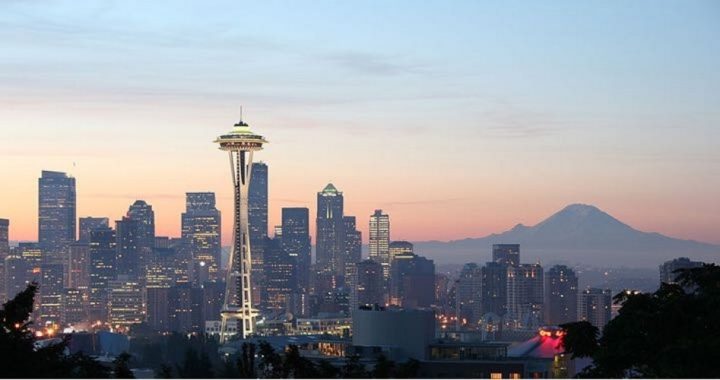
A study commissioned by Seattle’s city council just came back with results they didn’t want to hear: Their efforts to raise wages of the city’s lowest-paid workers are instead costing them about $125 a month. This is thanks to their employers cutting their hours in response to the law raising the minimum wage from $10.50 an hour to $13 an hour in 2016.
Mark Long, one of the authors of the University of Washington (UW) study, said:
If you’re a low-skilled worker with one of these jobs, $125 a month is a sizeable amount of money. It can be the difference between being able to pay your rent and not being able to pay your rent.
In addition, the UW study concluded that, thanks to the minimum-wage increase, some 5,000 low wage jobs in Seattle were never created.
All of which makes perfect economic sense: When the price of something is increased (such as the cost of labor), less of it will be demanded. That’s a law that neither the Seattle city council nor any other governmental body can repeal.
The biggest impact was on low-paying jobs following the mandated boost in 2016. The amount of pay in low-wage jobs (defined by the authors as those jobs paying less than $19 an hour) increased slightly overall, but it also resulted in a nine-percent reduction in total hours worked, which in turn resulted in a six-percent drop in what employers paid for such work.
The study was different, and more credible, than another study released by the University of California, Berkeley, just days earlier. The UW study didn’t limit itself just to restaurants but to more than 500 businesses in Seattle. And the authors constructed a “synthetic” model of Washington state businesses located outside of Seattle which weren’t impacted by the new minimum-wage law. Compared to that model, Seattle underperformed significantly among those earning less than $19 an hour.
The UW study analyzed data on the number of hours worked, data that the Berkeley study didn’t have or didn’t use. The UW study concluded that, after analyzing all the data, both jobs and hours for low-wage workers in Seattle declined faster than elsewhere in the state.
The new study has significant credibility according to David Autor of MIT, who reviewed the study and its conclusions prior to its publication. Said Autor, “This is a study that has the power to move people’s beliefs. It will have a substantial impact on the debate. It suggests that we should be proceeding cautiously when we start pushing minimum wages into ranges where they are pretty significant.”
And Jillian Henze, a spokeswoman for the Seattle Restaurant Alliance, added: “We think the U.W. study needs to be taken seriously by the city because the data echoes the anecdotes we’ve been hearing.”
There is a cost beyond simple dollars and hours. Mandated minimum-wage laws also impact those looking for work but don’t have the skills to justify the increased minimum wage. For them their minimum wage is zero, as explained by Jacob Vigdor, one of the authors of the UW study: “If you are someone trying to break into the labor market [and] get your first job — a young person or immigrant — that’s where it really seems like it’s become more difficult.” Added Vigdor, “Basically, what we’re doing [in Seattle] is we’re removing the bottom rung of the ladder.”
The UW study may have understated the impact of the minimum-wage hike as it didn’t analyze data from companies employing 500 or more people in Seattle, or ones with multiple locations outside the city. In anecdotal conversations with those companies, the UW researchers learned that they also had cut wages and hours for their low-paid people in response to Seattle’s new law. This suggests that there may have been even greater job losses for low-paid workers in those bigger businesses.
Ed Rensi, the former CEO for McDonalds, predicted what would happen if the minimum wage were raised:
I guarantee you if a $15 minimum wage [law is passed nationally], you’re going to see a job loss like you can’t believe.… It will mean wiping out thousands of entry-level opportunities for people without many other options.
Clinton Alexander, a former resident of Seattle, writing for the The New American back in 2015, also predicted the job losses. After interviewing a number of small business owners and professionals in his network, Alexander concluded:
The bottom line is that the minimum-wage law was supposedly created to help the poor and needy in our society. However, it is the low-skill and poor who will feel the effect first and foremost, and who will find it much more difficult to acquire the job skills needed to raise the value of their labor to or above the minimum wage.
The push for the boost in the minimum wage came primarily from a socialist on Seattle’s city council, Kshama Sawant, according to Alexander. For her, like other socialists, economic laws and conclusions such as those from UW mean nothing. Socialism is, at bottom, a religious belief that is impervious to such laws, facts, and conclusions. Barring a miracle, Seattle’s poorest and lowest-skilled workers will continue to suffer the most — the very people the council and Sawant claim they want to help. Under the city’s law, the minimum wage will continue to be raised even higher in the future.
Photo of Seattle: Rattlhed via Wikipedia
An Ivy League graduate and former investment advisor, Bob is a regular contributor to The New American magazine and blogs frequently at LightFromTheRight.com, primarily on economics and politics. He can be reached at [email protected].
Related articles:
Seattle’s Coming $15 Minimum Wage
Study: $15 Minimum Wage Would Force McDonald’s to Increase Prices 38 Percent



